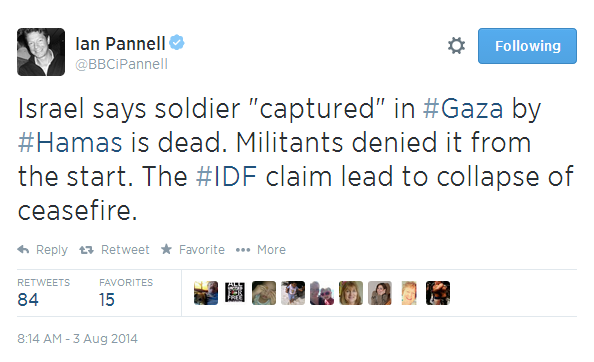Earlier we saw (here and here) how BBC News website reporting on a story that began with the infiltration of an Iranian UAV into Israeli airspace on February 10th focused audience attentions on a subsequent effect rather than on the cause. We also saw how the BBC News website unquestioningly gave amplification to disinformation put out by Iran and Syria while implying to audiences that there is room for doubt regarding the veracity of official Israeli accounts of the events. So did BBC radio do any better?
The BBC World Service radio programme ‘Newshour‘ devoted considerable airtime to that story on February 10th. The webpage of the afternoon edition of the programme presented the subject under the title “Israeli Airstrikes Hit Targets In Syria” without any mention of what began the sequence of events: the Iranian drone that infiltrated Israel.
“Israel has carried out large-scale airstrikes against targets in Syria. The Israeli Defence Force says it attacked air defence systems and sites linked to Iran. Earlier an Israeli fighter jet was brought down by Syrian anti-aircraft fire after a strike on what the Israelis say was an Iranian drone-launch site.”
Presenter Julian Marshall opened the programme with a similarly slanted view of the story:
Marshall: “In a moment: Israel attacks a dozen targets inside Syria. One of its planes is shot down.”
Marshall introduced the item itself (from 01:44) with a description that failed to adequately clarify that previous Israeli airstrikes against targets in Syria have been specifically aimed at preventing the transfer of weapons to Hizballah in Lebanon and are not connected to the civil war in Syria. [emphasis in italics in the original, emphasis in bold added]
Marshall: “Israel has carried out dozens of airstrikes on the Syrian armed forces and their allies since the outbreak of the civil war in 2011. But the latest are potentially the most serious: large-scale attacks against a dozen targets in Syria including, says Israel, air defence systems and sites linked to Iran. Earlier an Israeli jet crashed in Israeli territory as it encountered massive Syrian anti-aircraft fire. It had been attacking what the Israelis say was a site from which an Iranian drone aircraft was launched. The drone was shot down after it penetrated Israeli airspace. People in northern Israel and the Israeli-occupied Golan Heights reported hearing sirens and explosions.”
Listeners next heard very brief ‘man in the street’ interviews with two anonymous speakers before Marshall went on to unquestioningly parrot Syrian and Iranian propaganda.
Marshall: “Well Syrian state media has acknowledged the Israeli air raids and says more than one plane has been hit. Iran’s foreign ministry has rejected the Israeli claim of an Iranian drone while the deputy head of Iran’s elite Revolutionary Guards, Hossein Salami, said that Iran had no military presence in Syria and were only there as advisors. And this is how state controlled TV reported the downing of that Israeli plane.”
Audiences then heard a translated recording from Iranian TV.
“The end of the Zionist regime’s era of hit and run in Syria. For the second time in less than a week, the Zionist regime sent its fighter jets to Syria in the early hours of this morning. But this time, despite the expectations of Israeli officials, Syria’s air defence shot down an Israeli fighter jet.”
Marshall: “And as for Syrian government ally Russia, it’s called on all sides to exercise restraint and avoid escalation.”
Listeners next got an additional copious dose of Syrian regime messaging from a journalist who has in the past promoted the Assad regime’s denials of use of chemical weapons against Syrian civilians on the Russian government’s RT channel and who was described by Iran’s Press TV as ‘our correspondent’ in a report amplifying previous false Syrian regime claims regarding Israeli planes.
Marshall: “A short while ago I spoke to Alaa Ebrahim; a journalist in Damascus who works for Syrian state TV and international media. What have the Syrian authorities been saying?”
Ebrahim: “Well officially the Syrian government issued a statement this morning from the command of the Syrian army in which they said that Israeli fighter jet tried to attack Syrian army bases in central Syria and that Syrian aerial defences intercepted that airplane and managed to actually damage it without saying whether the plane went down or not. Well the Syria…what the Syrian government is saying right now is that they actually did not provoke the Israeli airstrike. The airstrike was initiated by Israel – it wasn’t a retaliatory act by Israel. On the other hand the Syrian government is saying that they were reacting to Israeli aggression against them. Later on the state news agency SANA said in its reports that aerial defences from the Syrian army intercepted several missiles fired from Lebanese air space from Israeli fighter jets targeting several bases belonging to the Syrian army both south and west of the Syrian capital Damascus and later on we got the statement that came out from what the Syrian government calls the operation room of the Syrian government allies in Syria which is usually a reference to Iranian advisors and Hizballah fighters fighting alongside the Syrian government and in that statement they said that there was not an Iranian operated drone flying over Israeli airspace and that all the drones belonging to the allies – which is a term used to refer to Iranian and Hizballah fighters – were accounted for, operating in the deserts of central Syria looking over positions belonging to terrorist groups such as ISIL and other groups. So these are the official statements we have been getting since dawn today about the latest developments and I think we can recap once again and say that the Syrian government is saying that they did not initiate anything – they were just reacting to an Israeli airstrike against them.”
Marshall: So the Syrians are…are denying that they were in any way involved with the flying of that drone over Israeli territory?”
Ebrahim: “No, I don’t think the Syrians are denying that they were involved with the flying of the Iranian drone. What the Syrians and their allies – Iran, Hizballah – are saying [is] that they have never flown a drone into Israeli airspace and as a result they say that the Israeli attack was unprovoked.”
Refraining from challenging any aspect of that long repetition of Syrian regime propaganda, Marshall then changed the subject and went on to ask what Damascus residents had heard on the morning of February 10th and whether “any kind of retaliation” is to be expected. After concluding that interview, Marshall introduced both his next guest and the redundant theme of ‘narratives’.
Marshall: “And we’ve approached the Israeli Defence Force for an interview but no-one is available. Anshel Pfeffer is an Israeli journalist with Ha’aretz newspaper and the author of a forthcoming book ‘The Turbulent Life and Times of Benjamin Netanyahu’. He joins us from Jerusalem. And Mr Pfeffer, the Israelis have a very different narrative of the events of the past 24-36 hours and for them the original provocation was the flying of this drone over their territory.”
Pfeffer: “Yes, that’s the Israeli version of events: that round about 4:30 am local time an Iranian drone entered Israeli airspace, was intercepted and shot down by an Israeli attack helicopter and that was what sparked off the chain of events of the last few hours.”
Marshall: You say an Iranian drone: why the certainty?”
Pfeffer: “Well that’s…like you said that’s the version of the Israeli government. They claim to have been tracking the drone, to have known its source at a launch site near Palmyra in northern Syria. According to the Israeli military they have the fragments of the drone and it’s an Iranian model. I’m assuming that at some stage they’ll present those pieces and we’ll be able to see whether it was indeed an Iranian drone. But it’s not new that there are Iranian…there is a significant Iranian military presence in Syria – has been since almost the start of the Syrian war in 2011 – and that this presence also has drone capabilities. So it’s not…the Israeli version of events is rather believable in this case.”
The conversation continued with discussion of the war in Syria and Russia’s role in the region.
By this time listeners could be forgiven for being confused. Was there an Iranian drone or wasn’t there? Is there an Iranian military presence in Syria or not? Rather than providing audiences with clear, concise and factually accurate information that would (as the BBC’s public purposes require) help them understand this story, the corporation once again opted to promote a ‘he said-she said’ account of events that actively hinders audience understanding.
When the BBC World Service launched a new foreign language service last year the then director of the division’s said that “[f]or more than 80 years the BBC World Service has brought trusted news to people across the globe” and the BBC’s Director General said:
“The BBC World Service is one of the UK’s most important cultural exports. In a world of anxieties about ‘fake news’, where media freedom is being curtailed rather than expanded, the role of an independent, impartial news provider is more important than ever.”
As we see, a considerable portion of this item was devoted to unquestioned amplification of unsupported claims and disinformation from two regimes that curtail media freedom – and much worse. But rather than providing listeners in those countries and others with the accurate and impartial information which would be the antidote to such propaganda, the BBC World Service simply facilitated a wider audience for Iranian and Syrian disinformation and added insult to injury by justifying it as ‘narrative’.
And as we will see in part two of this post, that practice continued in a later edition of ‘Newshour’.
Related Articles:
BBC jumbles cause and effect, amplifies disinformation in Iran drone story – part one
BBC jumbles cause and effect, amplifies disinformation in Iran drone story – part two





